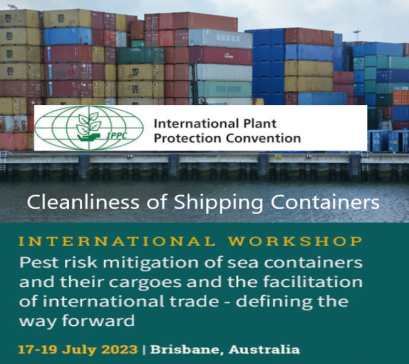The International Plant Protection Convention (IPPC) is an intergovernmental treaty (and part of the UN) signed by more than 180 countries. It aims to protect the world’s plant resources from the introduction and spread of pests and promotes safe trade.
The IPPC will be holding an international workshop on “Pest risk mitigation of sea containers and their cargoes and the facilitation of international trade – defining the way forward,” in Brisbane from 17-19 July 2023.
The workshop intends to increase awareness on the risks and impacts of movement of plants, plant products and other goods via shipping containers and cargo, through which plant pests may spread and disrupt international trade.
Industry stakeholders such as container owners, shipping lines, container manufacturers, freight forwarders, port authorities, marine terminal operators, shippers, importers, exporters and biosecurity experts from around the world will discuss how best to implement the recommendations of the CPM focus group on sea containers.
Note re the CPM: To implement the IPPC standards the Commission on Phytosanitary Measures (CPM) was established. The CPM promotes the full implementation of the convention’s objectives
Background: Container Cleanliness
Container cleanliness and so-called hitchhiker pests have become important issues in the shipping and logistics industry.
What constitutes a ‘clean’ container? Is it just a visual inspection of the inside and outside of a container, or a more thorough investigation? Some invasive species are easy to detect, sometimes on the outside of the container, and can be removed easily. Others are more difficult to spot and can live for several years without food and hide undetected in cracks and under the floors of sea containers. To assess what risk of infestation is present in each import container can be difficult.
Expected outcomes of the Workshop
- foster further awareness on the risks and impacts of moving, via sea containers and their cargoes, pests that are harmful to plants and promote the importance of the shared responsibility by all parties in the global supply chains to avoid contamination of containers and their cargoes;
- outstanding questions and issues that require further clarification are identified and discussed;
- collect additional input on how to reduce the introduction of pests through the sea container pathway for the FGSC to analyze and submit to CPM-18 (2024);
- feedback on the revised CPM Recommendation No. 6, is collected and shared with CPM Focus Group on Sea Containers in preparation of its report with recommendations for a long-term IPPC guidance to CPM-18; and
- feedback on the regulatory and non-regulatory solutions being considered by FGSC.
Location and dates
The workshop will take place from 17 to 19 July 2023, Brisbane, Sofitel Brisbane Central, Queensland, Australia. Participation is free of charge.
Australia has one of the world’s strictest biosecurity regulations and for good reason. It has been estimated that if a harmful infestation occurs, it could cost the Australian agricultural sector billions of dollars and damage our reputation as a supplier of clean agricultural products. Read our related article – New Website for Hitchhiker Pests [HERE].
Colless Young is a Licensed Customs Broker and International Freight Forwarder. We offer professional advice on all aspects of import and export procedures, including clearance through Customs and Quarantine, at all Australian ports and airports. Our logistics services cover airfreight and sea cargo, including fumigation, warehousing and trucking.

